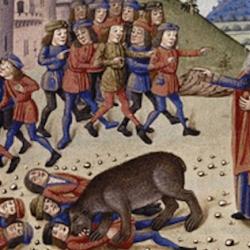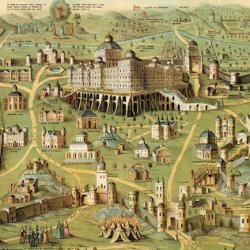Nathan MacDonald (Not Bread Alone, 176–7) has a fascinating chapter on the role of food in the establishment of Israel’s monarchy. In part, this has to do with agricultural policy, but it also has an anthropological dimension: Feasts form a circle around the crowned king, and who’s in and out of the feast is a signal of who’s in and out of royal favor.
When Nebuchadnezzar invades and destroys Jerusalem, the Davidic dynasty ceases to exist. But in 1-2 Kings, the very last scene returns to this framework. It is yet another scene of food, when Jehoiachin is elevated from prison to take a place at the table of the king of Babylon (2 Kings 25). Given the role that food has played throughout the monarchical narratives, this has to be significant. But of what?
MacDonald notes, “Comparison has been drawn with the demise of Saul’s dynasty and David’s actions towards Mephibosheth in 2 Samuel 9. In particular, both Jehoaichin and Mephibosheth are said to have ‘eaten bread continually’ at the tables of their respective overlords (2 Sam. 9.7; 2 Kgs. 25.29). Thus, as Mephibosheth’s presence at David’s table expressed the final demise of Saul’s house so also the hopes of the Davidic dynasty come to an end with the last descendant living out his life at another king’s largesse.” While Jehoiachin’s elevation may not promise a restoration of Davidic monarchy, it does offer “the prospect of a tolerable life under Babylonian hegemony.”
We can go a step further: The scene tucks the Davidic monarchy in under the Babylonian emperor, and that’s where the monarchy stays through to the end of the Old Testament. And, the Mephibosheth connection suggestively places Eval-Merodach, king of Babylon, in the place of David: Jehoiachin : Eval-Merodach :: Mephibosheth : David. The Davidic monarchy has been taken up into the imperial order, and the Babylonian king acts like a Davidide.
MacDonald notes that other intertexts suggest a more hopeful import: “The apparent end of monarchy should be heard in conjunction with its first announcement in Hannah’s song. Jehoiachin’s release from prison is another example of raising the ‘poor from the dust’ (1 Sam. 2.8). In the final verses of 2 Kings we may have a demonstration of YHWH’s justice to the ends of the earth in which he gives ‘strength to his king and exalts the horn of his anointed one’ (1 Sam. 2.10). If Jehoiachin’s experience in exile parallels those of Saul and David in their moments of anointing, we might have grounds for finding in Jehoiachin’s taking his place at Evil-Merodach’s table an anticipation of a future restoration of Jehoiachin and the Davidic dynasty to the Judahite throne.”
Within 2 Kings 25, further, “a subtle contrast is made between Zedekiah and Jehoiachin. When Zedekiah is defeated and captured Nebuchadnezzar ‘spoke justice with him’ (v. 6); in the case of Jehoiachin, by contrast, Evil-Merodach ‘spoke kindly with him’ (v. 28). The use of food language in the slaughter of Zedekiah’s son has already been noted; in the narrative this immediately follows Nebuchadnezzar’s sentence. For Jehoiachin the kindly words are followed by his elevation to the king’s table and above the other kings. If the slaughter of Zedekiah’s sons is indeed the indication of the end of his dynasty, then we may have further grounds for seeing in Evil-Merodach’s gracious actions towards Jehoiachin the establishing of his dynastic line. As with the transition between Ahab’s house and Jehu’s, one dynasty finds itself slaughtered or sacrificed, whilst the other begins to eat palace food.”
As throughout the monarchical texts, kingship and food are intimately tied together.















